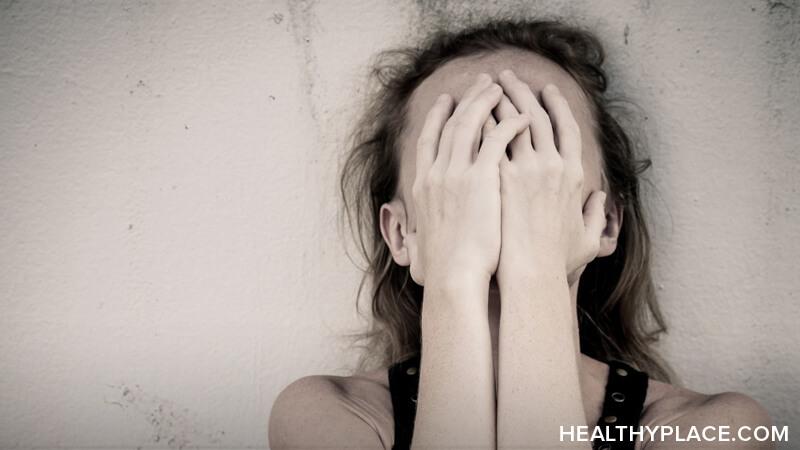Feeling Guilty for Self-Harm

Telling yourself to stop feeling guilty for self-harm is like trying not to think about pink elephants. It feels like you can't help it, and the harder you push it away, the tighter it seems to grip onto your gray matter. But believe it or not, you can move past guilt and finally begin to heal.
The Guilty Self-Harm Downward Spiral
I've written before about how anxiety and depression can fuel a downward spiral into hurting yourself to cope. Guilt and self-harm have a similar relationship.
Sometimes, guilt comes first. If you feel guilty about something in your past—even if it's not recent, and even if it's not something you actually need to feel guilty about—it can be tempting to turn to self-harm as a way to punish yourself, and perhaps even relieve yourself of some of that shameful burden.
Other times, guilt is the effect, and self-harm is the cause. You might self-injure in order to cope with some other negative experience or emotion, such as stress, only to feel guilty about the act itself afterward. In my case, I felt guilty about my self-harm because I felt like my emotions weren't valid. I had a good life and a good family to support me, and I felt ashamed for feeling like I needed to hurt myself in spite of all that.
This is problematic enough, but the real danger here is the possibility of creating a loop that can be increasingly difficult to break. You feel guilty, so you self-harm. But then you feel guilty again—so you self-harm again, and so on.
Letting Go of Guilt to Heal from Self-Harm
I know how impossible it may sound, but feeling guilty for self-harm won't help you get better. It's vital to let go of the things holding you back from healing, and that includes any shame you might feel about hurting yourself.
This might not mean much coming from a stranger on the Internet, but I'll say it anyway—just know that I do mean it. You are not broken. Self-harm is nothing to be ashamed about. It is not an indication that something is wrong with you as a person. Rather, it's a sign that you are hurting and may need help to stop hurting.
So, yes, I do recommend working with a therapist or other medical professional if you can. An outside perspective, especially an expert one, can help you see your situation (and yourself) in a new light. The right therapist can make all the difference in paving a smooth path forward.
However, even if you're working through this on your own for now, know that you are not alone. Others, like me and like you, have struggled through the difficult process of understanding, accepting, and ultimately letting go of guilt related to self-harm. And others, like me (and perhaps you too, one day), have moved past that step and down the path to lasting recovery.
There is no one right way to do it, no ultimate cure that applies to everyone. It begins with recognizing where your guilt comes from—what exactly do you feel bad about, and why? For me, the next step from here was to begin to question the logic that led me to feel ashamed. Do the reasons make sense? Are they based on facts and real-world evidence or emotions and opinions that may not reflect reality at all?
It's easier if the latter is true. For example, you might feel guilty because you think self-harm makes you a bad person—but if you're generally a kind and considerate person, the evidence of this will help you realize that you're actually a good person in a bad situation.
If you've done something wrong, something that you objectively feel you should feel guilty about, that's harder. In this case, it's helpful to remember that you don't have to let go of all of your guilt right now. It's a process, one that may take days, weeks, months, or even years. Just because you're not ready to forgive yourself today doesn't mean you can't begin loosening the ties that bind you so tightly to that guilt.
If you can right your wrong—without causing more pain to whoever you hurt in the first place—begin thinking about how and when to do so. If you can't, think about what you can do instead, something that will help others rather than hurt them. It won't erase the past, but it will make the future something worth pursuing. And, with time, you may be able to let go of your guilt after all—or at least make peace with it.
APA Reference
Kim Berkley
(2022, April 14). Feeling Guilty for Self-Harm, HealthyPlace. Retrieved
on 2026, March 5 from https://www.healthyplace.com/blogs/speakingoutaboutselfinjury/2022/4/feeling-guilty-for-self-harm